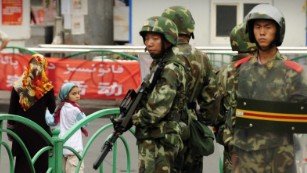(CNN) Every day, US-based Uyghur journalist Gulchehra Hoja tries to call her family in the Chinese region of Xinjiang. Sometimes she tries up to 20 different numbers, just hoping that someone will pick up. “I know they won’t pick up the phone, but I try … nobody picks up,” she told CNN in an interview from her office in Washington.
She doesn’t expect an answer because 23 of her family members — including her aunt, her brothers, her cousins — have disappeared, along with tens of thousands of other ethnic Uyghurs inside enormous state-controlled “re-education camps.” […]
“They are transformation centers, and they really are aimed at completely altering Uyghur culture and identity. It’s kind of a surreal practice, I would say, that is definitely unprecedented in the 21st century,” Sean Roberts, director of the International Development Studies Program at George Washington University, told CNN. […]
The Belt and Road is part of the reason that there’s such an urgency to clean up the Uyghur population in Xinjiang at the present moment,” Roberts said.
“What really concerns me is that, if it’s really the last chance to try to transform Uyghurs, what’s the next step if they decide that the Uyghurs can’t be transformed into a passive benign minority that’s loyal to the state?” he said. […]
Read More © CNN










